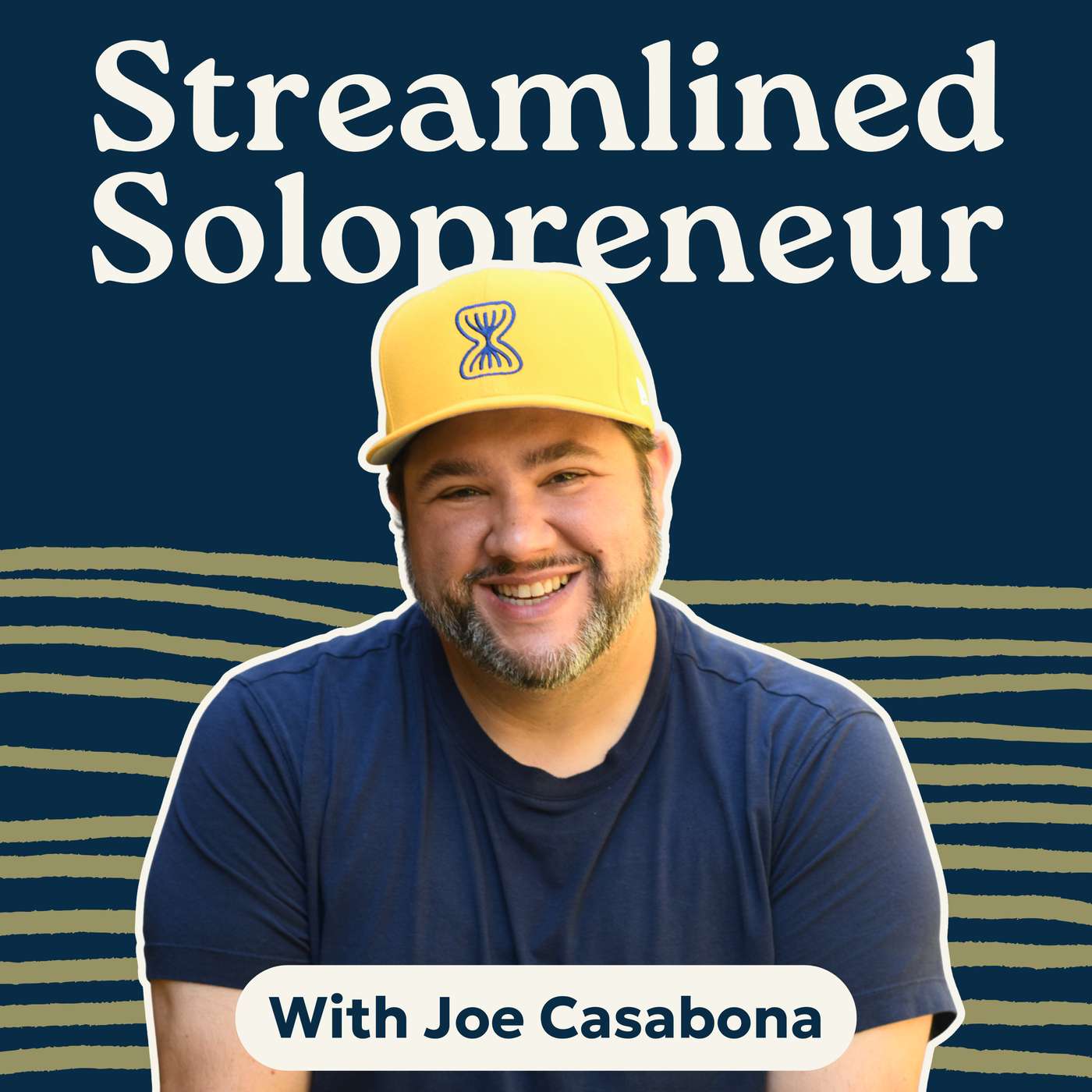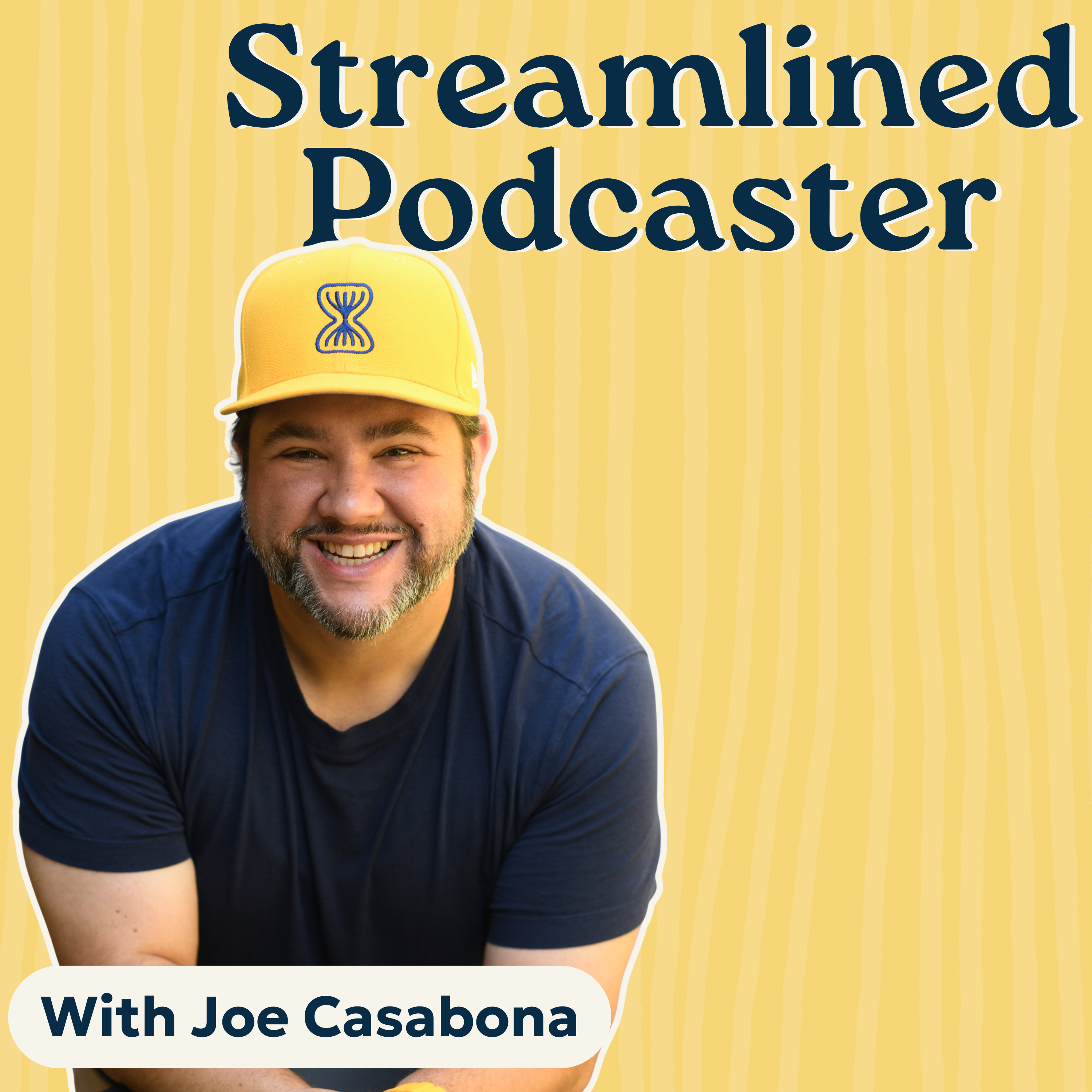
Podcasting Made Simple
Podcasting Made Simple is the premier podcast about podcasting! We’re here to help podcast guests and podcast hosts reach more listeners and grow their income so they can change more lives! Join Alex Sanfilippo and other podcasting industry experts as they share how you can level up on either side of the mic! (Show notes and resources: https://PodMatch.com/episodes)
Podcasting Made Simple
Overcoming Impostor Syndrome in Podcasting | Tara Halliday
Are you a podcaster struggling with impostor syndrome? You're not alone. Over 70% of high achievers experience it, and it can lead to blame, regret, and disappointment. Thankfully, there are simple coping mechanisms to help you overcome these feelings! In this episode, Tara Halliday explains the surprising root cause of impostor syndrome and how to get free from it. Get ready to begin developing unconditional self-worth to start breaking the vicious cycle!
MORE FROM THIS EPISODE: HTTPS://PODMATCH.COM/EP/282
Chapters
00:00 The Experience of Imposter Syndrome in Podcasting
03:54 Recognizing and Managing Imposter Syndrome Symptoms
07:37 The Root Cause of Imposter Syndrome
09:02 Overcoming Imposter Syndrome: Changing Beliefs and Developing Unconditional Worth
Takeaways
- Imposter syndrome is a common experience for podcasters, causing feelings of self-doubt and inadequacy.
- Imposter syndrome is not low self-esteem or a medical condition, but rather a normal functioning that can be managed.
- There are three types of imposter syndrome symptoms: imposter syndrome thinking, physiological stress, and imposter syndrome behaviors.
- The root cause of imposter syndrome is a belief that your worth as a human being depends on your performance.
- To overcome imposter syndrome, it is necessary to change this belief and develop unconditional worth.
MORE FROM THIS EPISODE: HTTPS://PODMATCH.COM/EP/282
📊 This month's Independent Podcasters Report is now available! To see podcasting industry insights that matter for indie podcast hosts and podcast guests, please visit https://PodMatch.com/Report!
You're listening to Podcasting Made Simple. Jeff was a successful podcaster with over 250 episodes under his belt. That is, he wasn't a beginner. And when he came to a conference like this, he'd get high fives and fist bumps, congratulations from his fellow podcasters. And Jeff smiled and made excuses. Oh, it was just good timing, he said. Oh, I just got lucky to get that guest. But even though all his stats showed that Jeff was crushing it, He didn't feel like it. In fact, he felt like a fraud. He felt like despite all his success that he still wasn't quite good enough. He would get huge names on his show and then in the middle of the interview, he'd wonder how on earth he got here. He compared himself to his expert guests and then he'd feel intimidated by them. He was a bit of a perfectionist and he'd often re -record himself because he didn't like how he sounded the first time around. and he could easily spend six hours editing a 45 -minute show. Jeff would also over -prepare by doing way too much research, but then his interviews felt more like an interrogation rather than a flowing conversation. And this went on for some time, and it didn't seem to get better with practice. Each episode he released was a huge sense of relief, and then he'd worry if he could do it again the next time. And the strain was starting to show. Jeff was exhausted, edging towards burnout. He couldn't sleep worrying about it all. And finally, it became too much and he quit. He felt that maybe he just wasn't cut out to be a podcaster after all. He'd started with all this fantastic passion and joy, was excited to get his message out there and make a difference, educate and entertain people. And yet he felt he wasn't good enough. This is a typical podcaster's experience of imposter syndrome. And if you recognize yourself in this, know that you're not alone because over 70% of high achievers experience imposter syndrome at some point in their career, men and women equally. And this includes podcasting, whether it's a side hustle or your main job. When podcasters quit due to imposter syndrome, they blame themselves, they feel like a failure, they have regret and disappointment. But it doesn't have to end like that. So we're going to look at imposter syndrome, what it is, what it's not, what causes it, and what you can do about it so that you can keep doing the podcasting that you love. Imposter syndrome is the secret feeling of being a fraud when you're not, when you are successful, but you just don't feel it inside. And you think that at any moment people are going to find you out and then you're going to be exposed. If you Google imposter syndrome, you'll find a lot of myths and misinformation about it as well. Firstly, it's not low self -esteem. You can be highly confident, competent, and yet still feel like you have imposter syndrome. It's also not a medical syndrome. Although the name syndrome is a specific medical term, imposter syndrome is not a pathology. That means it doesn't need medication and it doesn't need a psychotherapy or diagnosis. It's actually considered normal functioning by therapists. It's just not particularly happy functioning. Imposter syndrome isn't about being a beginner either. It affects people who are already successful, people who look at their success and say, why doesn't this prove that I'm good enough? It's feeling like you're not quite good enough. It's also not your personality. It's not a weakness and it's not a flaw. Now I'm going to take you through three secrets about imposter syndrome today. The first secret, It's about how you recognize imposter syndrome. Most people don't know that there are three types of symptoms. There's the imposter syndrome thinking, the physiological stress that comes with it, and the imposter syndrome behaviors. Imposter syndrome thinking is self -doubt, feeling not quite good enough, self-judgment and self -criticism. The physical stress is tension in your body that then triggers your nervous system to respond. as if you're threatened by danger. You go into fight, flight, or freeze states, and that reduces your creativity, your decision -making, and even temporarily lowers your IQ by 13 points. It disturbs your sleep, and it creates feelings of anxiety and overwhelm. Then there are the imposter syndrome behaviors that we saw with Jeff. These include comparing, perfectionism, procrastinating, over -preparing, avoiding opportunities, keeping it a secret, and just pushing through. Now everyone experiences their own unique combination of these symptoms, which is why generic advice that you find on the internet is often not much help. The imposter syndrome thinking that you're not quite good enough and you're going to get caught signals your nervous system that you're in danger, and this triggers your nervous system to try and protect you with fight, fright, and freeze responses. And when your system is stressed like this, it drives you to try and cope. Somehow you've got to do something about it. And so you do those automatic reactive imposter syndrome behaviors, such as perfectionism, procrastination. Then you stop criticizing yourself for doing these behaviors because you know it's not helpful to spend six hours exhausting yourself editing your show. When you judge these behaviors, it feeds back into the imposter thinking that, oh, maybe I'm not quite good enough after all. Maybe I'm not cut out to be a podcaster. And the cycle continues. To manage imposter syndrome, you need to break that cycle. Now, how would you do that? First, you need to use techniques to get yourself calm so that your nervous system can be more relaxed and so that you're not so stressed. This means you'll be less driven to use the coping behaviors such as procrastination or perfectionism. And when you notice yourself doing these behaviors, then you need to see these behaviors as coping mechanisms. Don't blame yourself for it. Instead say, hey, look, if I'm being a perfectionist right now, I'm doing it because I'm stressed. So let's go back and try and get calm. And when you don't judge yourself, then your mind is calmer and it doesn't trigger your nervous system. So I'm So this is how you unwind or break that cycle of symptoms. The key is to address all three types of symptoms at the same time. Don't leave one out. Then we come to the third secret about imposter syndrome. What really causes it? You can see all these symptoms. This is what we see. But then the question is why? If I'm so successful, do I feel like I'm not quite good enough? Why I can't just... Take the proof of that last great review or the massive downloads I'm getting and use it as proof that I am good enough. The reason is because the root cause of imposter syndrome is not those symptoms. The root cause of imposter syndrome is deeper. It's unconscious, which means that we're not aware of it, which was why it's so confusing because we can't see it. The root cause of imposter syndrome is a belief, a very specific belief that you're worth as a human being. depends on what you do. That is, if you do something good, you are good. If you do something bad, you are bad. That is, it's a belief that your worth as a human being is conditional. Now let's apply it to podcasting. If you do a great show, you are good. If you do a bad show or even a mediocre show, then you are bad. And this belief triggers everything. It drives all of those imposter syndrome thoughts. physiological reactions and the behaviors. This is good news because it means that imposter syndrome has a complete solution. To get rid of imposter syndrome permanently, you need to change the belief that causes it. Changing that belief means developing unconditional worth. Unconditional worth is if I do a great show, I'm the same person. If I make a whole bunch of mistakes and put out even a mediocre show, I'm still the same person and I accept myself without criticising myself. Of course, you'll still be motivated to do a great quality show, but you won't beat yourself up. It also means that if someone else criticises the show or even praises it, it just washes over you. You don't take it personally. Get this and it changes your internal world. It feels like effortless confidence, limitless possibilities and deep self-acceptance. The fundamental points of imposter syndrome are it's not you, you're not alone in this, and you can do something about it. Lastly, Alex wanted me to leave you with a quick tip. Well, now you know that imposter syndrome isn't solved with a quick tip. But here's how you can stop comparing yourself to one of your amazing guests. If you find yourself comparing yourself to them, notice that you're comparing the differences. And this is very natural for your brain. Your brain's always looking out for danger so that it can keep you safe. And this means observing what is different, what's changed in your environment. It's a normal pattern. So you can't stop yourself comparing. But if you notice yourself comparing, realize that you're automatically looking for differences. So switch it around and start looking for how you are the same. How am I similar to my guest? How am I the same as my fellow podcasters? Start to list all the ways that you and them are the same. So even if you have Richard Branson, Elon Musk, or Michael Jordan on your show, ask yourself, how am I the same as them? The more you do that, the more you'll feel like them. You'll relax more, you'll feel like an equal, and you'll feel like you belong exactly where you are, following your passion and putting out some fantastic podcasts. For more episodes, please visit podmatch.com forward slash episodes. Thank you so much for listening.
Podcasts we love
Check out these other fine podcasts recommended by us, not an algorithm.

Content Is Profit
BIZBROS
Win The Content Game
Deirdre Tshien - CEO & co-founder of Capsho, AI-powered Content Marketer (the fastest way to repurpose and market your expert content)
Fastlane Founders and Legacy with Jason Barnard: Personal Branding, AI Strategies, and SEO Insights
Jason Barnard Entrepreneur and CEO of Kalicube
Hacks and Hobbies with Junaid Ahmed
Junaid Ahmed
I Have A Podcast by Vinnie Potestivo
Vinnie Potestivo
The Small Business Storytellers with Seth Silvers
Seth Silvers
Streamlined Solopreneur: Tips to Help Small Business Owners Grow Without Burnout
Joe Casabona, Business Systems Coach
Insider Secrets to a Top 100 Podcast with Courtney Elmer | Podcasting Strategy for Business Growth
Courtney Elmer | PodLaunchHQ.comDo The Thing
Stacey Lauren
Tech Bytes - with Dan Hafner
Dan Hafner

